
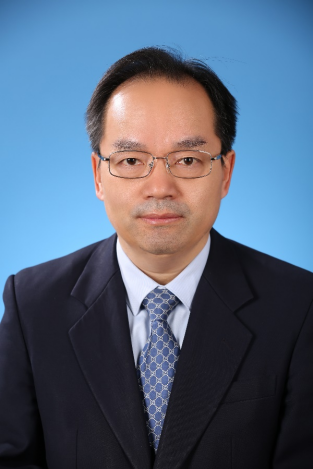
Professor Mei Shengwei
Mei Shengwei, male, Han nationality, native of Xinye, He’nan, born in Yili, Xinjiang in 1964. He is a tenured professor in the Department of Electrical Engineering and Applied Electronics (EEA) at Tsinghua University, vice president of Qinghai University and dean of the School of Energy and Electrical Engineering, winner of the National Science Fund for Distinguished Young Scholars and Changjiang Scholars, IEEE and IET Fellow, member of the Chinese Society for Electrical Engineering, the Chinese Association of Automation, and the Chinese Society for Electrical Power Engineering. He leads the academic group for the “Large-scale Wind and Solar Power Regulation” project funded by the National Natural Science Foundation, serves as the chief scientist of the National Energy Administration’s energy storage demonstration project, chief scientist of Salt Cavern Company of China National Salt Industry Group, chief expert of China Three Gorges Corporation, and director of the Multi-energy Complementary and Green Energy Storage Laboratory of Yellow River Hydropower Corporation. In recognition of his outstanding contributions in the field of new energy and energy storage, on August 26, 2023, the Ho Leung Ho Lee Foundation Evaluation Committee unanimously decided to award Mei Shengwei the “Ho Leung Ho Lee Foundation Science and Technology Innovation Award” for the year 2023.
Professor Mei Shengwei has been engaged in research in the field of large-scale safe transmission, efficient absorption, and clean storage of new energy for a long time, achieving systematic innovative results that have been widely applied.
Major Technological Achievements:
(1) Technology of Long-distance Safe Transmission of High-capacity New Energy Electricity: He proposed the nonlinear robust control theory of power systems and the critical theory and analysis method of complex power grid self-organization. He invented the technology for rapid identification of vulnerable components and dangerous fault paths in hybrid AC/DC systems, developed nonlinear robust excitation/regulation industrial control devices for large synchronous generators, and the interlocking fault active interruption platform. These technologies have been applied in the major power transmission corridors from west to east in China, ensuring the safe transmission of new energy electricity of over 140 million kilowatts. The achievements won the National Natural Science Second Prize in 2008 (Professor Mei as the second completer) and the National Science and Technology Progress Second Prize in 2018 (Professor Mei as the first completer).
(2) Theory and Technology of Efficient Absorption of Large-scale New Energy: He founded the engineering game theory, solving scientific problems of multi-source, multi-end, and uncertain system optimization scheduling control for new energy power systems. The Engineering Game Theory has been included in the new subject direction (F030416) under “Control Science and Engineering” by the National Natural Science Foundation of China. He developed a multi-time scale robust integrated control platform for new energy power systems, applied in over 700 wind and solar farms in Qinghai, Tibet, and other areas. In the past five years, over 130 billion kilowatt-hours of new energy have been absorbed, providing theoretical and technical support for the safe and economical absorption of tens of millions of kilowatts of wind and solar power. The achievements were awarded the First Prize of Science and Technology Progress in Qinghai Province in 2018 (Professor Mei as the first completer), the First Prize of Science and Technology Progress in the field of Renewable Energy in China in 2020 (Professor Mei as the first completer), and the Technical Invention Award of the China Electricity Council (Professor Mei as the first completer).
(3) Technology and Key Equipment of Non-Adiabatic Compressed Air Energy Storage: He proposed the non-adiabatic compressed air energy storage technology route, led the development of core equipment such as non-steady-state compressors, low-loss heat exchangers, and wide-operating-range air turbines, forming a complete technical system with independent intellectual property rights. He supervised the construction of the national energy storage demonstration project “Jiangsu Jintan 60MW/300MWh Salt Cavern Compressed Air Energy Storage Power Station,” which has been in commercial operation to date, with a cumulative safe operation of 406 times, peak-shifting power of 160 million kilowatt-hours, and a stable electrical-to-electrical conversion efficiency of around 62%. This efficiency improvement is 7 percentage points higher than the adiabatic power station in McIntosh, USA, achieving dual leadership in China in the technical research and engineering practice of compressed air energy storage in the world. The achievements won the First Prize of Science and Technology Progress in Anhui Province in 2019 Professor Mei as the first completer) and the first Technical Invention Award of the China Society of Electrical Engineering in 42 years (Professor Mei as the first completer) in 2022.
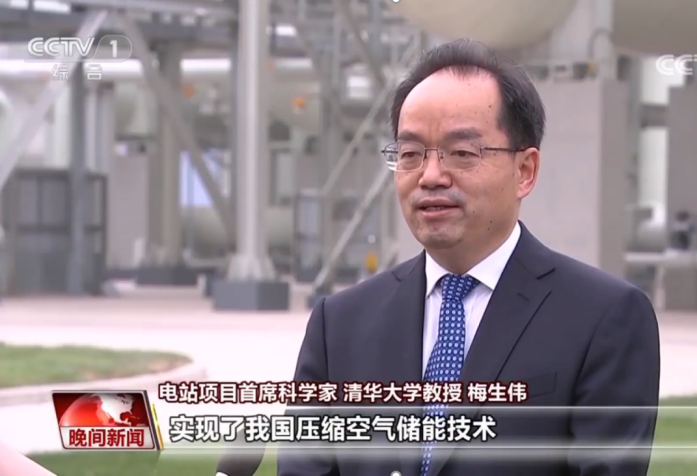
Professor Mei Shengwei interviewed by China Central Television (CCTV)
Professor Mei Shengwei has conducted 10 monographs (2 in English), 2 textbooks, and published 512 journal papers (262 in SCI), cited over 28,000 times; 7 highly cited papers in ESI, and 5 papers in the top 5000. He holds 175 patents (3 in the United States) and has won one second prize each of the National Natural Science Award and the Science and Technology Progress Award at the national level and 11 first prizes at the provincial and ministerial levels.
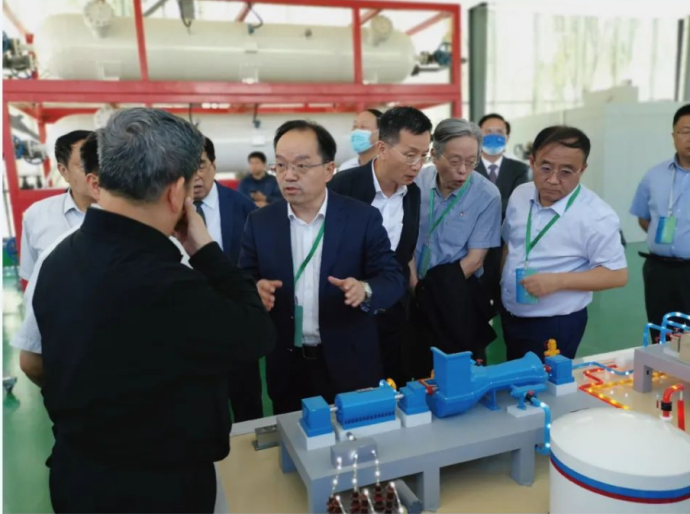
Professor Mei Shengwei introduces the Compressed Air Energy Storage System at the Solar Energy Base of Qinghai University
Professor Mei Shengwei, mentored by Academician Lu Qiang, adheres to the school motto of Tsinghua University, “Self-Discipline and Social Commitment.” He has won the Tsinghua University Teaching and Educating Award and the Good Teacher and Friend Award seven times each and the title of Outstanding Communist Party Member and Advanced Worker at Tsinghua University three times each. In addition, since 2003, he has been fighting on the front line of national defense research and supporting the western region. He has been selected as one of the 100 most outstanding science and technology workers in Qinghai Province and one of the 100 most outstanding science and technology workers by the Publicity Department of the Central Committee.
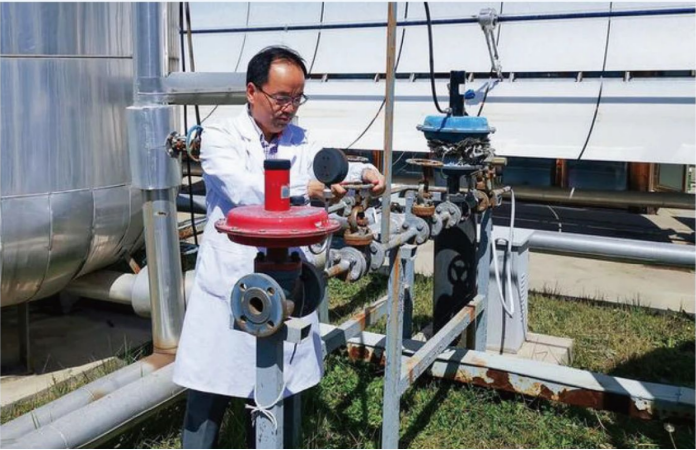
Professor Mei Shengwei at the Solar Comprehensive Utilization Engineering Demonstration Base of Qinghai University
About the Ho Leung Ho Lee Foundation Award
The Ho Leung Ho Lee Foundation Award is established by the Ho Leung Ho Lee Foundation to reward outstanding scientific and technological workers who have made outstanding achievements and major innovations and promote the development of science and technology in China.
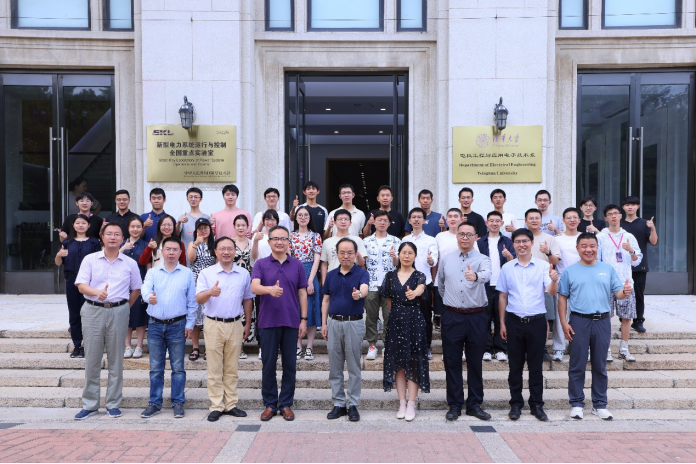
Professor Mei Shengwei’s research team at Tsinghua University
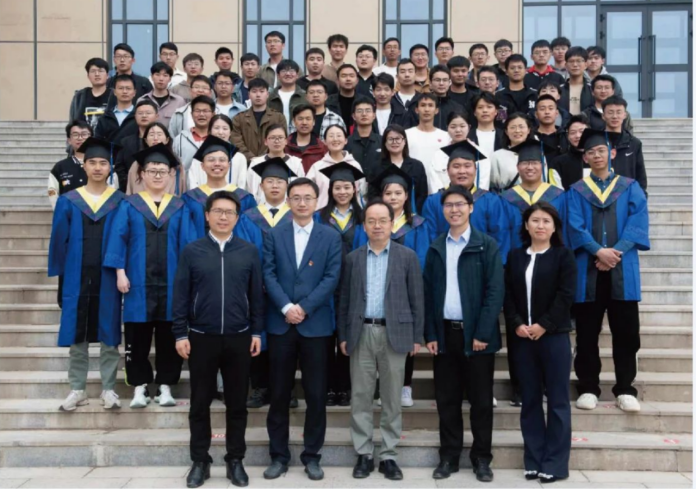
Professor Mei Shengwei’s research teams at Qinghai University

















 News & Events
News & Events